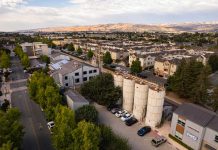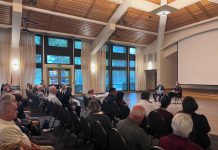Great ideas fail because of poor execution. The City of Morgan
Hill’s
”
Community Conversations
”
program is a great idea.
Great ideas fail because of poor execution. The City of Morgan Hill’s “Community Conversations” program is a great idea.
The conversations were planned to allow city residents an opportunity to offer their ideas on the levels of service the city provides and how it pays for them. Like I said, it is a great idea. However, this great idea now appears bogged down in an execution plan that is destined for failure.
Today, we live in an age of transparency. We demand it from business. We expect it from government. What with the Federal Government’s admittance about wiretapping and the on-going argument in Congress regarding the most sensitive elements of the USA Patriot Act still in the balance
I think it would be best that the City take a very open, forthright approach to the Conversation. Word that most of the “community conversations” will be held in private homes and that they will not be open to the press or public is troubling because it runs counter to the city’s original stated goal of opening up the process to the community.
There is a fairly significant segment of the population that feels government doesn’t listen to its constituents. For example, when the “Community Conversations” were first announced several months ago at a Morgan Hill Chamber of Commerce breakfast, each table was given sheets to fill out asking for participation.
The eight of us at our table read the sheets while Morgan Hill City Manager Ed Tewes described the concept. The other seven, some gadflies amongst them, put their sheets down and went about their business.
“Why?” I asked. “Because they’re going to do what they are going to do,” I was told.
That is an unfair generalization, but it serves as a good description of how people feel these days about their government whether it is at the local, state or federal level.
Most people willing to participate don’t want to sit in a meeting not knowing how or when to speak up. All of the meetings should be open to the public and held at the underutilized Community Center.
I also believe it would be beneficial to provide regular updates to the community on the meetings, published in the local newspapers. These updates could serve the city well instead of corrupting the overall process of the “Community Conversations,” something the city fears.
These updates would allow the city to build an evidentiary case for whatever recommendations eventually result from the meetings and invite inquiry from those who have yet to be included in the process.
The City could thus have the appropriate staff people at this meeting along with at least one of the five elected representatives. A common format would be adopted making it easy for the information gleaned to be consolidated, assimilated AND PUBLISHED for the public to see and City staff and council to coordinate and digest.
The “Community Conversations” are a new idea for Morgan Hill. And, it is a well-meaning initiative to broaden the connection between city government and the people who live and work here. But it isn’t the only way for the citizens to speak with their government.
If people are uncomfortable with the “Community Conversation” they can get their position across in several ways.
A private conversation with an elected type or City staff person may ease the pain. If the comfort level still isn’t there, a conversation with a “conveyer” of information they are comfortable with such as a head of an organization that would be affected such as the Chamber of Commerce, IDI or a sports group – or even by calling this newspaper.
Holding some of the “Community Conversation” meetings in private homes and closing them to public witness sends a message to the skeptics that the city has already decided what it will do, and that the meetings are window dressing.
City leaders should not fear that shedding sunlight on the “Community Conversations” would skew the process.
A well-run meeting is possible and no doubt one of the requirements that the city’s well-compensated consultants must meet.
It is all about being open, having that transparency that people want so that they feel that when they say something they will know that their government is hearing them.
In his 1972 bid for re-election, then President Nixon convinced the public that, “the Silent Majority,” would re-elect him. The best bumper sticker of that campaign was one that stated, “The Majority is not Silent, the Government is Deaf!”
It is a lesson the political and governmental leaders of Morgan Hill would be wise to heed.
Alex Kennett represents South Santa Clara County on the Santa Clara County Open Space Authority and serves on the board of directors of Joint Venture Silicon Valley and the Morgan Hill Chamber of Commerce. He is the former interim Executive Director and is a businessman in Morgan Hill.







